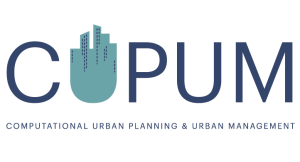
Computational Urban Planning and Urban Management
For more than 30 years, the CUPUM (Computational Urban Planning and Urban Management) conferences have been the premier international conference for the exchange of ideas and applications of computing technologies to address a diverse range of social, managerial, and environmental problems impacting urban planning, management and development. The CUPUM conferences bring together the international research community at the intersection of digital technologies, data science, urban planning, and city shaping.
